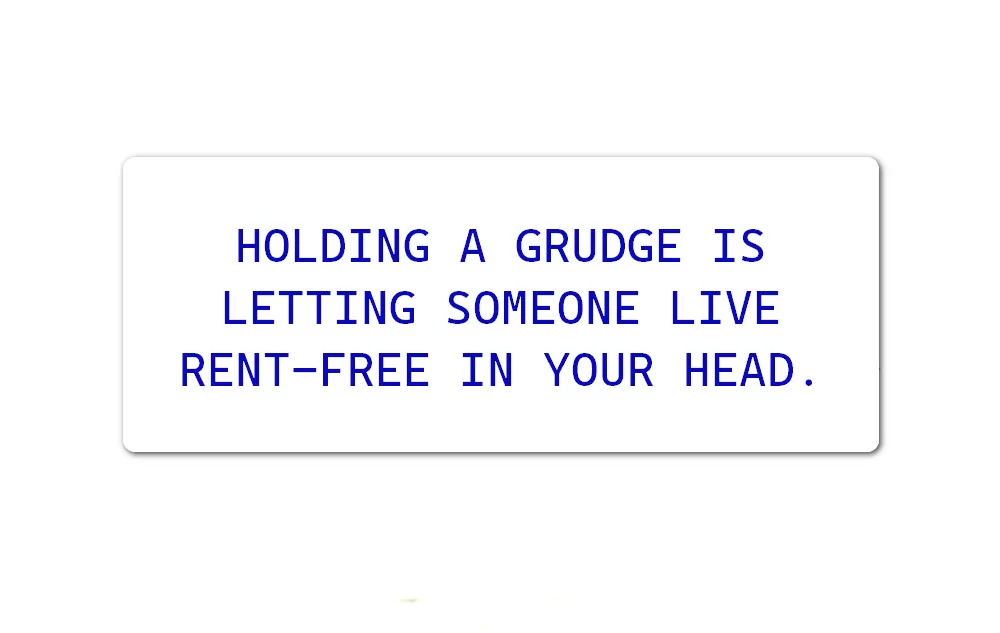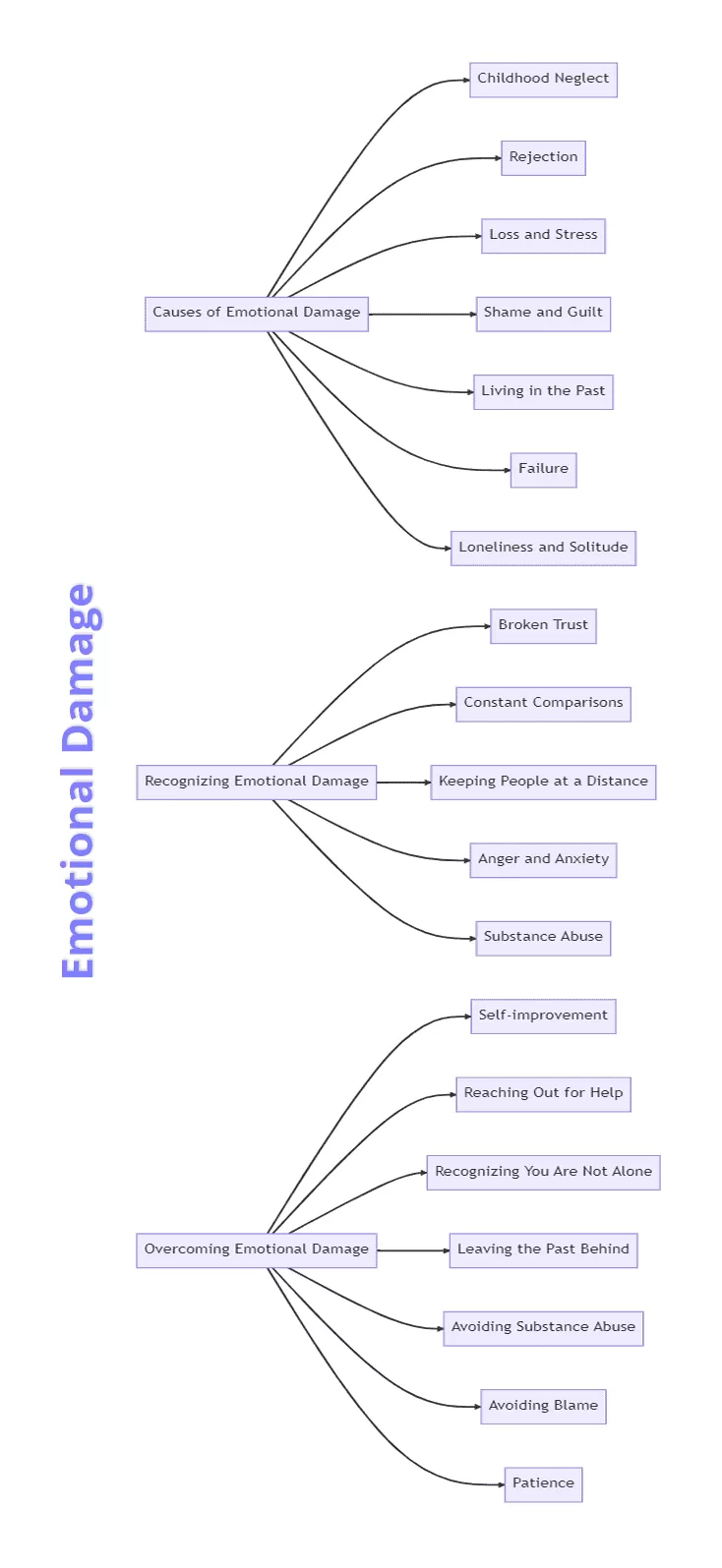Have you been feeling emotionally empty and detached from the world, but can’t figure out why? Find out the signs if you are emotionally damaged.
Emotional damage is a weight you feel you’re carrying around, but you can’t see it.
This background stress may have its roots in past experiences you do not even remember well.
But its damage is showing up in more and more areas of your present life, degrading your relationships and destroying your mental peace.
It can make you react in abnormal, unnecessary ways, bringing up half-memories of an old emotional wound.
Let’s find out how to recognize its presence, understand its cause, and heal from emotional damage, and.
What does it mean to be emotionally damaged?
The term “emotionally damaged” describes someone whose emotional wellness has been harmed due to traumatic incidents in the past. Emotionally damaged people may experience symptoms like anxiety, depression, and difficulty trusting others.
Since it’s hard for them to trust others, they cannot easily build meaningful relationships. They also have difficulty controlling their emotions, which makes them often react with stress or anger.
They may also develop defensive habits like skepticism, over-sensitivity, and a preference for solitude.
While these defenses guard against further emotional trauma, they can also hurt relationships, hinder personal growth, and decrease life-satisfaction.

How do you know if you’re an emotionally damaged person?
An emotionally damaged person often feels and acts differently, like feeling empty of emotions, becoming angry at small things, and having low moods that seem inexplicable.
Sometimes, emotional damage is masked by unrelated behaviors and reactions, when it can make the person feel “vaguely clear” that something is wrong, but they are never sure.
Here are 12 signs that you might be emotionally damaged:
- Trusting others seems like an uphill battle for you.
- You still bear the emotional scars of a past breakup.
- Small irritations can spark a wildfire of anger within you.
- Meeting new people brings a wave of unease and anxiety.
- You’ve endured severe emotional pain for an extended period.
- A sense of gloom and depression frequently overshadows you.
- Your friends express concern about your emotional well-being.
- You maintain a safe distance from others, physically and emotionally.
- You’re caught in the loop of comparing your own life with those around you.
- You often find solace in solitude, preferring your own company over others’.
- You have a tendency to shut down emotionally when faced with conflict or stress.
- Your past relationships continue to cast a shadow over your new romantic interests.
Let’s explore a few of those signs of emotional damage:
Broken Trust
Broken trust, especially in significant ways, can be a sign of emotional damage. It can lead to difficulties in forming new, trustworthy relationships.
Trust is one of the most basic requirements of a relationship, and once it gets broken, it can be extremely difficult to fully trust another person in the same role.
If someone has been cheated on by a love interest, they may not only find it very hard to rebuild trust in the cheating partner, but they may also not fully trust any other romantic partner.
Constant Comparisons
An unusual pattern of self-comparison may appear like a quirk of your personality, but it could be a sign of deeper emotional damage.
If you constantly compare yourself or your loved ones to a particular person, it could be a sign that you’re still emotionally damaged by that person.
Anger and Anxiety
Frequent outbursts of anger over small issues and feelings of anxiety when meeting new people can be signs of underlying emotional damage.
Anxiety comes from a worry that you may get hurt in a similar way by another person, making you stay hyper-vigilant.
Anger is often the result of not having responded “correctly” at the time of hurt, or because of carrying a grudge to take revenge at an appropriate time.

Keeping People at a Distance
It is difficult falling in love with a damaged person because their past hurt has taught them to push away people who try to get close.
If you have a tendency to keep people at arm’s length, it could be a sign you have deep-seated emotional damage.
It is often a protective measure to prevent potential emotional harm.
Substance Abuse
This is perhaps the saddest part of being emotionally damaged, when the person tries to avoid or numb their difficult emotions with alcohol or other substances of abuse.
Substance abuse can be a sign that the emotionally damaged person does not want to or is unable to cope with the difficult emotions in the aftermath of the emotional hurt.
Being in an altered consciousness helps them forget their mental pain and escape from reality.
What are the causes of emotional damage?
Emotional damage isn’t just a result of bad experiences; it is it’s usually caused by painful experiences and situations that leave lasting scars.
This complex emotional state may be caused by a parent on their child, a person on their romantic partner, or events like personal failures.
Here are some causes of emotional damage:
Childhood Neglect
Childhood forms the foundation for our emotional health. Neglect during this critical period can lead to lasting emotional damage. This neglect could take many forms, from a lack of emotional support to physical neglect.
Rejection
Repeated rejection can significantly dent a person’s self-esteem and result in emotional damage. This rejection could be in relationships, professional life, or social settings, leading to a fear of future rejection.
Loss And Stress
The loss of a loved one or chronic stress can cause emotional damage. Grief and stress can lead to feelings of hopelessness and depression, influencing one’s emotional well-being.
Shame And Guilt
Shame and guilt, often resulting from past mistakes or societal expectations, can cause emotional damage. These feelings can lead to self-blame and a feeling of unworthiness.
Living In The Past
Being stuck in past experiences, especially traumatic ones, can lead to emotional damage. It prevents a person from enjoying the present and anticipating the future.
Personal Failure
Repeated failures can cause emotional damage by impacting a person’s self-confidence and leading to fear of trying new things.
Loneliness And Solitude
Chronic loneliness and isolation can lead to emotional damage. Lack of social interaction can lead to feelings of alienation and depression.

How To Overcome & Heal The Emotional Damage
Self-improvement
Working on oneself is crucial in overcoming emotional damage. This could include learning new skills, pursuing hobbies, or seeking professional help.
Reaching Out for Help
Talking to someone you trust or a professional can help process the emotions and provide the necessary support.
Recognizing You Are Not Alone
Knowing that you are not alone in your struggle can provide comfort. It’s important to remember that everyone goes through tough times and it’s okay to ask for help.
Leaving the Past Behind
Try to keep the past in the past. Holding onto past hurts can prevent healing and growth.
Avoiding Substance Abuse
Drugs and alcohol only provide temporary relief and can complicate the healing process. It’s essential to avoid substance abuse while healing from emotional damage.
Avoiding Blame
Avoid blaming others or yourself for your emotional state. It’s crucial to focus on healing and moving forward.
Patience
Healing takes time. Be patient with yourself throughout the healing process. It’s a journey, not a race.
Emotional damage can be a difficult obstacle in life’s journey, but with understanding, recognition, and patience, it’s possible to overcome it. Always remember that help is available and you’re not alone in your journey.
FAQs
How to love someone who is emotionally damaged?
Loving someone who is emotionally damaged can be challenging, but it may be possible with empathy and patience. Here are some key points to consider:
Patience: Understand that healing takes time. Be patient and give them the space they need to process their feelings.
Communication: Maintain open lines of communication. Encourage them to share their feelings and thoughts, but don’t push them if they’re not ready.
Support: Be a strong support system for them. Your support can be a source of comfort and reassurance during their healing process.
Boundaries: Respect their boundaries. If they need space or time, provide it without taking it personally.
Professional Help: Encourage them to seek professional help if they haven’t already. Therapy can be extremely beneficial in dealing with emotional damage.
Consistency: Be consistent in your actions and promises. Consistency builds trust, which can be difficult for someone who is emotionally damaged.
Love: Show them love and kindness even when things are tough. Genuine love can be a powerful healing force.What to do if someone is emotionally damaged?
When interacting with someone who is emotionally damaged, it’s crucial to approach them with sensitivity and understanding. Here’s what you can do:
Listen: Give them a safe space to express their feelings without judgment. Sometimes, being heard can make a world of difference.
Empathize: Try to understand their perspective and validate their feelings. Avoid minimizing their experiences or telling them to “just get over it”.
Respect their boundaries: They might need more personal space or time alone than others. Try to respect these needs and don’t pressure them into sharing more than they are comfortable with.
Offer support: Let them know you’re there for them. This could be as simple as saying “I’m here for you if you want to talk,” or helping them find professional resources like therapists or support groups.
Be patient: Healing from emotional damage takes time. Be patient with their progress and avoid pushing them to recover faster.
Encourage professional help: If they’re open to it, encourage them to seek help from mental health professionals. Therapists and counselors are trained to help people navigate emotional pain and trauma.
Final Words
To be “emotionally damaged” is like carrying a heavy heart. It’s the lingering pain that follows hurtful experiences, making it hard to trust and connect with others.
It’s a defense mechanism, like building a wall around your heart to keep the pain out. But this wall can also keep joy and love at bay, making life feel less vibrant and full.
But you can be happier in life despite your emotional damage.
• • •
• • •
Author Bio: Researched and reviewed by Dr. Sandip Roy. His expertise is in mental well-being, positive psychology, narcissism, and Stoic philosophy.
√ If you liked it, please spread the word.